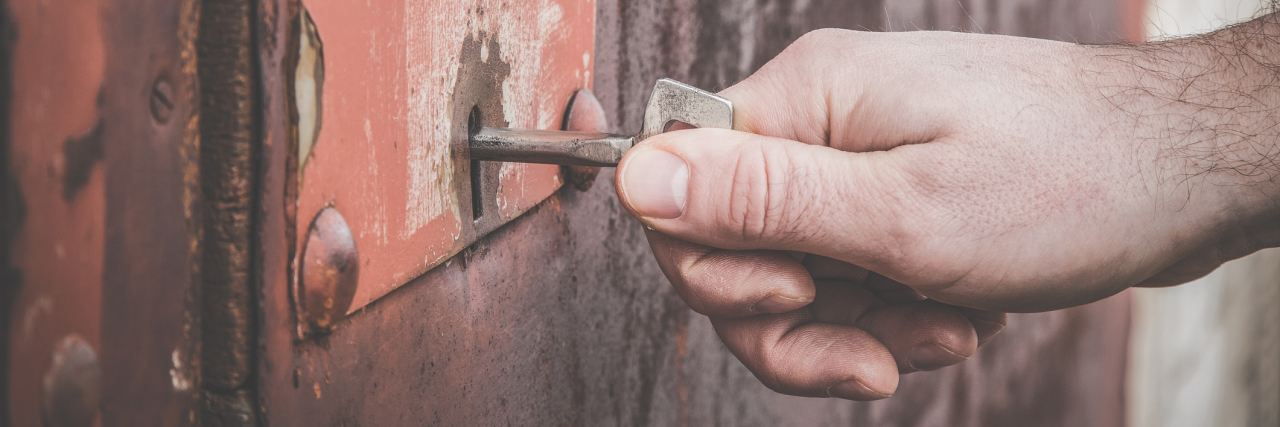Cystic fibrosis is often under the bracket of “invisible illness” because if you maintain your symptoms, you can appear (at first glance) to be very similar to everyone else.
It’s because of this that people with cystic fibrosis tend to either go unnoticed or be that person who’s just “different” from other people. It’s difficult to fit in and get along with others when you’re alienated in this way.
A big part life with this condition is behind the closed door of our homes. With treatment and medication taking up a lot of the time we spend at home, it’s not something everyone else sees. Why would we? It’s not something we’re proud of or want to appear like we’re after sympathy by showing or telling you what our life is like.
Between medicines, exercise, physiotherapy and potentially periods of time where we’re on oxygen and intravenous antibiotics, it’s all of these things that we need to appear “normal” and to go about our daily lives. It’s not something we want to show you because we want to be seen as the same as everyone else.
A lot of this comes down to fear of judgment, which I’m sure we all feel to a certain extent; but for people that have a medical condition, this is exaggerated, as we are aware of how different we are. We are fully aware that we might not be able to do all the things others can do. We know that we eat the same foods as you, go to the same places as you, spend time around the same people as you – and we would actually prefer that way because our health becomes top priority.
We have to prioritize. We need to think about how the consequences of our actions will impact our health, because our actions probably will impact our health if we go too far. How will missing that exercise class impact me? How will missing that meal make me feel later? Will be deciding to go out with my friends have repercussions that will mean I end up suffering for it for days afterwards? These are all questions that we ask ourselves, and if we want to make sure we stay healthy physically, we have to make some decisions that potentially become more and more difficult as we get older and have more responsibilities.
As you can probably tell, living with cystic fibrosis has two doors: the physical door is just as effective at making this condition invisible as the mental door, meaning inside our own heads.
I mentioned fearing people judging us plays a part, but having something that makes us distinctly different from the majority makes us very self-conscious of how we’re perceived. We don’t want to show our “true selves” because that means putting or condition on display, so we close off. We keep to ourselves; we’re often the “quiet ones.” It’s because of this that we keep a lot to ourselves.
We can be so often frustrated because it’s not like we enjoy our treatment and taking our medication. We don’t do this for fun, so we often are fed up and sad and depressed. Let’s face it, no one likes doing things they don’t want to do, and we have to do these things on a daily basis.
But it’s for that reason that I spend a lot of my time doing the things I do want to do. I learned that I needed to balance the bad with the good. If I ever had to make a choice between something I don’t want to do, and something I do want to do, I’m always going to choose what I do want to do. No question about it. This can come across a little strict or selfish, but when you have to spend hours a day doing things you don’t really want to do everyday, just to feel normal, a balance needs to be stuck somewhere. Otherwise, it really starts to eat at you mentally.
You start to wonder if it’s all worth it, if you’re doing it for the right reasons. But, having things each day to look forward to makes the difficult things seem not so bad.
Don’t get me wrong, having things that “I just need to do” helps me develop discipline and mental strength to. It helps me understand that adversity is a part of life and being successful at whatever you want to do.
Having routines and processes to take yourself through can help you be more productive.
Doing things you enjoy can help you balance the things you don’t and an help you keep consistent even when things get difficult. If you don’t enjoy it, and doing it starts to get hard, you’re more likely to quit altogether. So, making the process easy and enjoyable is important if you’re going to be consistent with anything.
Living with cystic fibrosis has taught me a lot of lessons that has helped me be successful in the endeavors that I’ve set my mind to. I honestly don’t think I’d be were I am today without it.
We want to hear your story. Become a Mighty contributor here.
Thinkstock Image By: FotoDuets

